100 Cryptocurrency Trivia for New Friends
As the market recovers, more and more new friends have come to the crypto world; but in addition to the most well-known wealth-making power, the great charm of this circle lies in the fact that it is a free place for the fermentation and awakening of Internet culture and crypto humanism. In just over a decade of evolution, countless strange and astonishing stories have been staged; in this article, I will select and list 100 representative cryptographic trivia to share with you. Perhaps these are already familiar to OGs, but I believe that for most new friends, they will still feel very "cold" and fresh:
#01
Satoshi Nakamoto, the founder of Bitcoin, is an extremely mysterious figure. So far, we still don't know the true identity behind this name.
#02
The total supply of Bitcoin is limited, and a maximum of 2,100,000 can be produced. As of March 27, 2024, the number of Bitcoins that have not yet been mined is 1,334,237, less than 6.4% of the total. (You can check the latest data here: https://explorer.btc.com/en/btc)
#03
Satoshi Nakamoto embedded a message from The Times in the Genesis Block of Bitcoin: "The Times 03/Jan/2009 Chancellor on brink of second bailout for banks", which is considered a comment on the financial crisis at the time.
#04
In 2009, Satoshi Nakamoto sent 10 bitcoins to programmer Hal Finney, which is considered the world's first bitcoin transaction.
#05
On May 22, 2010, programmer Laszlo Hanyecz exchanged 10,000 bitcoins for two pizzas. This transaction is regarded as the first record of actual use of Bitcoin, and is now celebrated by the Bitcoin community as "Bitcoin Pizza Day every year.
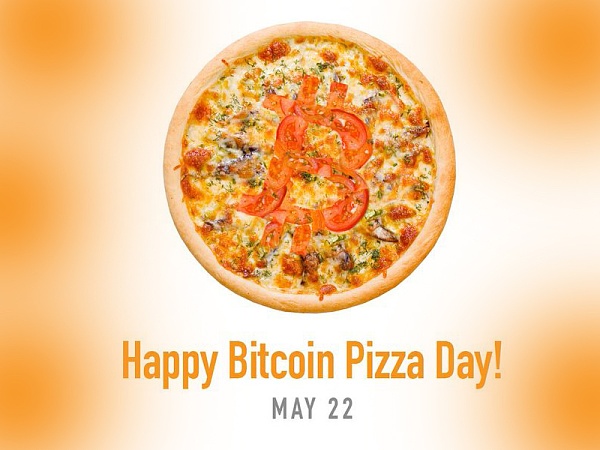
#06
In 2013, a computer programmer who was mining Bitcoin accidentally deleted his computer's hard drive and lost 7,500 Bitcoins; the estimated value of this lost asset today (2024) is $500 million.
#07
In 2013, the world's first Bitcoin ATM was opened in Vancouver, Canada, allowing people to easily convert cash into Bitcoins.
#08
In 2013, a Bitcoin enthusiast and explorer named Mike Caldwell buried a Bitcoin paper wallet when he reached the North Pole, symbolically bringing Bitcoin to the extreme end of the Earth.
#09
In 2014, a Bitcoin holder used Bitcoin to buy a burger, fries, and Coke at a McDonald's in Canada, which was the first use of Bitcoin in a physical store.
#10
In 2016, Bitcoin transactions were verified on the International Space Station, which means that Bitcoin has actually entered space ...1
In 2016, Bitcoin transactions were verified on the International Space Station, which means that Bitcoin has actually entered space.
#12
In 2016, Bitcoin transactions were verified on the International Space Station, which means that Bitcoin has actually entered space.
#13
In 2016, Bitcoin transactions were verified on the International Space Station, which means that Bitcoin has actually entered space.
#14
#11
In 2018, a company called "Long Island Iced Tea" announced that it would change its name to "Long Blockchain", and its stock price immediately soared 200%.
#12
In 2019, Microsoft became the first major tech company to accept Bitcoin payments.
#13
There is a cryptocurrency called "PotCoin" that is specifically designed for the cannabis industry.
#14
Although Bitcoin is the first successful cryptocurrency, it is not the first attempt by humans in this field. In 1998, computer engineer Wei Dai proposed "B-money", an unimplemented anonymous, distributed electronic cash system. Nick Szabo also proposed a concept called "Bit Gold", which can be seen as the predecessor of Bitcoin.
#15
When shutting down the online black market Silk Road, the FBI confiscated a large number of Bitcoins. For a period of time, this made the US government one of the largest Bitcoin holders in the world.
#16
Some small countries, such as the Marshall Islands, are trying to create their own national cryptocurrency to attract investment and promote economic development.
#17
To keep Bitcoin producing an average of one block every 10 minutes, the network adjusts the mining difficulty every 2016 blocks (about two weeks). This ensures that the rate of Bitcoin production remains relatively stable regardless of changes in global computing power.
#18
Ethereum is an open-source blockchain system that introduces the concept of smart contracts. These smart contracts are self-executing programs that are able to execute complex transactions and contract terms without an intermediary.
#19
CryptoKitties is an Ethereum-based game launched in 2017 that allows players to buy, collect, breed and trade virtual cats, each of which is a unique non-fungible token (NFT). The game quickly became popular after its launch and caused significant congestion on the Ethereum network.
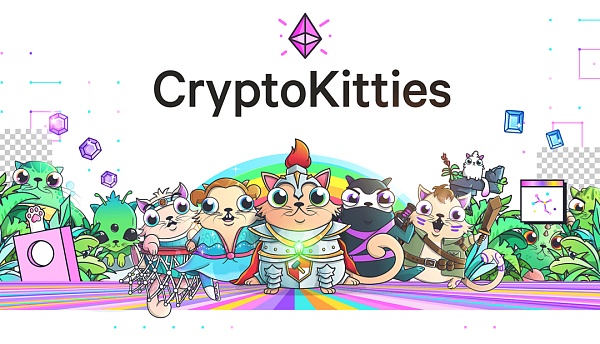
#20
Vitalik Buterin proposed the concept of Ethereum in 2013 when he was only 19.
#21
A blockchain may fork when its participants cannot reach a consensus on certain rules. In this case, a single chain splits into two different versions of the chain, each with its own rules and records. Both Bitcoin and Ethereum have experienced multiple notable forks.
#22
Studies have shown that the volatility of the cryptocurrency market can have a significant impact on investor sentiment and behavior, and there is even a term like "Bitcoin anxiety" to describe those who pay too much attention to market fluctuations.
#23
In 2014, a company called Mars One began accepting Bitcoin to purchase "deeds" to land on Mars, although this has no legal effect.
#24
In Venezuela, traditional currencies have lost almost all value due to severe inflation. Many residents have turned to Bitcoin and other cryptocurrencies as a medium of exchange and store of value. Cryptocurrencies here not only help people protect their wealth from inflation, but also enable them to receive remittances from abroad.
#25
Bitcoin tycoons usually spread their wealth across multiple wallets, but according to public blockchain data, some wallet addresses hold more than 100,000 bitcoins. These wallets may belong to individuals, exchanges, or other types of organizations.
#26
Bitcoin's blockchain can not only record transactions, but also store small amounts of arbitrary data. This allows some people to use the Bitcoin network to store permanent, unchangeable data, such as copyright notices or other important information.
#27
In 2018, the hash of a Bitcoin block began with "21e8", which is a number with special meaning in cryptography and physics. This immediately sparked widespread speculation and theories in the community, with some suggesting that this was an intentional act rather than a random event.
#28
Want to easily check your Bitcoin address balance? Try Google Search, as it has integrated Bitcoin blockchain information into its search results, enabling billions of users to access address balances and transaction details alongside regular web search results.
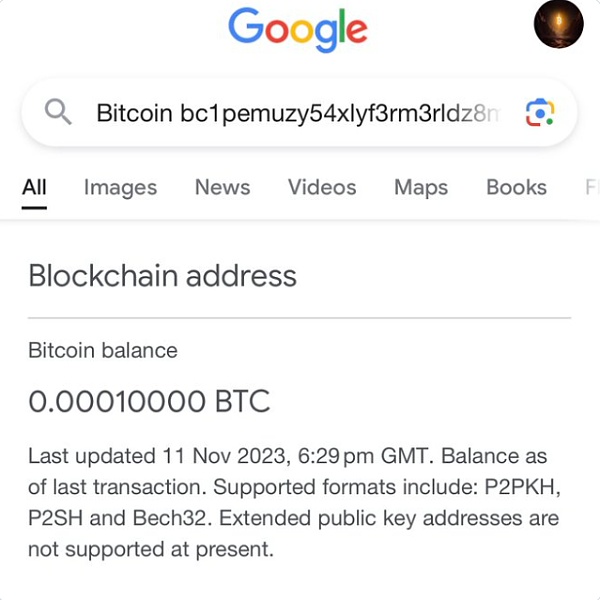
#29
It is estimated that approximately 4 million Bitcoins may never be spent. These bitcoins may have gone missing for a variety of reasons, including forgotten wallet passwords, damaged hard drives, and the death of the bitcoin owner without leaving instructions for the use of their estate.
#30
As cryptocurrencies have become more popular, many countries have begun to develop tax guidelines requiring citizens to declare cryptocurrency transactions and pay the corresponding taxes.
#31
In addition to Bitcoin and Ethereum, there are thousands of other cryptocurrencies, many with very exotic names such as "Dogecoin, " "Garliccoin" and "Bananacoin."
#32
In addition to the Proof of Work (PoW) mechanism used by Bitcoin, there are many other types of consensus mechanisms, such as Proof of Stake (PoS), Delegated Proof of Stake (DPoS), and Byzantine Fault Tolerance (BFT). Each mechanism has its own characteristics and application scenarios.
#33
In addition to Bitcoin Pizza Day, the cryptocurrency community also celebrates other days, such as "Ethereum Day" and "Dogecoin Day".
#34
In 2014, a Bitcoin mining company called Genesis Mining sent a paper Bitcoin wallet into space, which reached the outer atmosphere via a balloon. The action was called the first "space transaction" of Bitcoin.
#35
The Republic of El Salvador, located in northern Central America, is the first country in the world to use Bitcoin as legal tender.
#36
The global food company Walmart has partnered with IBM to use blockchain technology to track the food supply chain to ensure the safety and freshness of food. In this way, Walmart is able to track the origin of products in seconds, which previously could take days.
#37
In 2013, a teenager named Erik Finman used his scholarship money to buy Bitcoin when the price of Bitcoin was only $12. A few years later, the price of Bitcoin soared to several thousand dollars, making him a millionaire.
#38
Bitcoin was once widely used in the black market because it can protect the anonymity of users. For example, drug transactions on the black market often use Bitcoin for payment.
#39
Bitcoin has surpassed the market value of gold many times. The first time it surpassed was at the end of 2017, when the price of Bitcoin soared to nearly $20,000 and its market value reached about $3.2 trillion, exceeding the market value of gold at the time. But then the price of Bitcoin fell sharply, and its market value also fell.
#40
Some cryptocurrency investors choose to use their wealth for charity. For example, a cryptocurrency investor named Peter Saddington made $2.5 million with his Bitcoin in 2017 and donated $850,000 of it to charity.
#41
Mt.GOX Incident is considered one of the most serious incidents in the history of cryptocurrency. In February 2014, the world's largest Bitcoin exchange MT.GOX was hacked and lost nearly 850,000 Bitcoins (equivalent to 7% of the global total). This incident not only caused the price of Bitcoin to plummet by 80%, but also triggered a crisis of confidence in the cryptocurrency market.
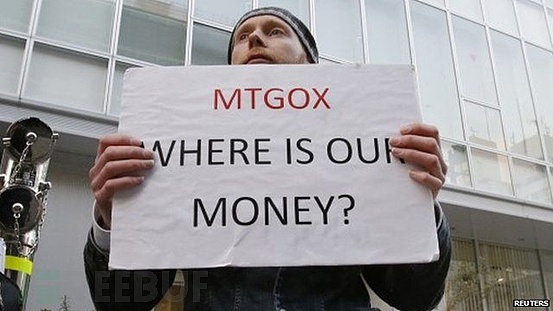
#42
In 2017, many startups raised billions of dollars through ICO (Initial Coin Offering). This new fundraising method that bypassed the traditional capital market and banking system without intermediaries reached its peak that year and created countless legends of getting rich quickly.
#43
In the summer of 2020, decentralized finance (DeFi) projects showed explosive growth, so people called that period "DeFi Summer".
#44
2021 is called the "Year One of the Metaverse". Because this year, the concept of the Metaverse began to become widely popular, and many technology companies made major investments and layouts in this field. For example, Facebook changed its name to Meta, indicating the company's determination to transform and focus on the Metaverse. In addition, Metaverse-related technologies and applications have also been significantly developed and promoted this year.
#45
The Blockchain Trilemma is a theory proposed by Ethereum founder Vitalik Buterin, which refers to the inability of a blockchain network to achieve security, decentralization, and scalability at the same time.
#46
Tether (USDT) is a stablecoin whose value is pegged 1:1 to the U.S. dollar; but when it was first launched, it was called Realcoin .
#47
Some users use Bitcoin addresses as artistic creations, carefully selecting the characters of the address to form readable words or phrases. This type of address is called a "Vanity Address".
#48
On January 3, 2009, Satoshi Nakamoto mined the first block of Bitcoin, the Genesis Block, on a small server in Helsinki, Finland, and received the "first mining" reward - 50 Bitcoins.
#49
《The Merge》 is the most expensive NFT artwork sold so far. It was created by a famous artist who goes by the pseudonym Pak and was successfully sold on the NFT market Nifty Gateway for $91.8 million from December 2 to 4, 2021.
#50
In a Bitcoin forum post in 2013, a user accidentally created the word "HODL" due to a typo, which originally meant "hold", indicating that Bitcoin should be held even if the market fluctuates. The word quickly became a buzzword in the cryptocurrency community.
#51
In 2014, a couple decided to record their wedding vows on the Bitcoin blockchain, becoming the first couple to record their marriage on the blockchain.
#52
In 2015, multiple language versions of the Bitcoin white paper were embedded into the Bitcoin blockchain. This is a tribute to the open source and global spirit of Bitcoin.
#53
In the 666,666th block of Bitcoin, a hidden text message was found; this message quoted the Bible verse: "Do not be overcome by evil, but overcome evil with good – Romans 12: 21."
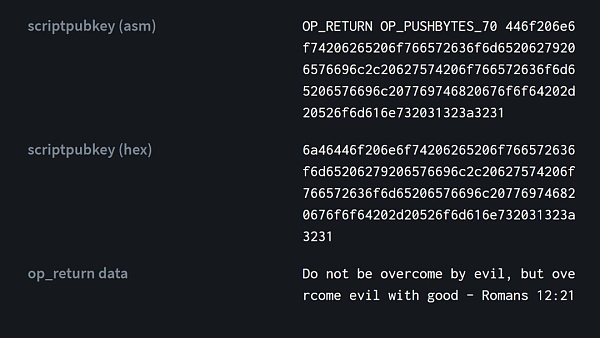
#54
In addition to text, some users even hide image data in Bitcoin transactions. These images are split into multiple data fragments and scattered in the OP_RETURN field of multiple transactions.
#55
Cryptocurrency makes micropayments possible and economical, which has promoted a new culture of appreciation, where users can send small amounts of cryptocurrency directly to content creators as appreciation.
#56
In 2018, Blockstream announced that its satellite network began broadcasting Bitcoin blockchain data, allowing Bitcoin transactions and block information to be received anywhere in the world even without an Internet connection.
#57
Cryptocurrency has been accepted as a donation method by more and more political campaigns and candidates, becoming an emerging role in political funding.
#58
A neighborhood in Manhattan, New York, is nicknamed "Bitcoin Street" because merchants there generally accept Bitcoin payments.
#59
In 2016, the Ethereum-based decentralized autonomous organization The DAO was hacked, resulting in the theft of $50 million worth of Ether. This incident shocked the entire crypto world and eventually led to the Ethereum community deciding to conduct a hard fork to recover the funds, resulting in two independent blockchains: Ethereum (ETH) and Ethereum Classic (ETC).
#60
A small business called Bitcoin Mining Heat uses the heat generated by Bitcoin mining to provide heat for greenhouses. This combination of blockchain technology and environmental protection not only solves the problem of mining equipment emitting a lot of heat, but also creates a sustainable ecosystem.
#61
In 2017, a cryptocurrency investor mistakenly sent more than $3 million worth of Ethereum to a wrong address during a transaction, which caused him to lose the Ethereum forever. This incident, known as the Fat Finger incident, reminds people to be extra careful when trading in cryptocurrencies.
#62
Some universities have started accepting Bitcoin as a form of tuition payment, while also offering courses on blockchain and cryptocurrency.
#63
Dogecoin was originally created as a joke, with its logo being a popular "dog" meme. However, this "joke" currency grew into a project with a huge market cap with the support of the community.
#64
Vitalik Buterin, the founder of Ethereum, was originally a member of the Bitcoin community. He came up with the idea of adding more features to the Bitcoin blockchain, but it did not receive widespread support from the community. Therefore, he decided to create his own project - Ethereum.
#65
Physical assets such as real estate, art, and even personal time can be tokenized through blockchain technology, which allows users to buy and trade parts of an asset without owning the entire asset.
#66
There is a theory called the "Bitcoin Death Spiral" which involves the adjustment mechanism of Bitcoin mining difficulty. In theory, if the price of Bitcoin drops significantly, miners will lose money and shut down their mining equipment, which will cause the network's hash rate to drop, making the time it takes to generate blocks longer, further causing more miners to quit. Although this theory has caused some discussion within the Bitcoin community, it has not happened so far.
#67
There was a security vulnerability in Ethereum's early code called "Blade Wave" that allowed attackers to repeatedly withdraw the same Ethereum tokens. This vulnerability was fixed in 2016.
#68
In 2018, SaveDroid, a German cryptocurrency startup, suddenly had a "runaway" message on its website after raising about $50 million through an ICO. The CEO tweeted a photo of a beach, suggesting that he had escaped. However, this was actually a PR stunt to raise awareness of the ICO scam.

#69
In 2019, Canada's largest cryptocurrency exchange QuadrigaCX announced that its founder Gerald Cotten died unexpectedly during a trip to India, and with him went the funds of the exchange's customers because he was the only one who knew the password to the exchange's cold wallet. A total of about 190 million Canadian dollars worth of cryptocurrency could not be withdrawn, which triggered a lot of conspiracy theories.
#70
There are some cryptocurrency projects on the market whose tokens are still listed and traded on exchanges despite no active development or practical use. These are called "zombie" tokens and are generally avoided by investors.
#71
SpaceChain is a space exploration project that uses blockchain technology to place blockchain nodes on satellites in space with the goal of creating a decentralized space exploration network.
#72
Facebook announced its cryptocurrency project Libra (later renamed Diem) in 2019, aiming to create a global digital currency. The project was immediately scrutinized and criticized by regulators around the world for concerns about the impact it could have on financial stability and user privacy rights.
#73
Proof of Burn (POB) is an unusual consensus mechanism where miners demonstrate their long-term commitment to the network by "burning" a portion of the coins (sending them to an address that cannot be spent). This is seen as an investment, as the act of burning coins means miners have an incentive to maintain the long-term health of the network.
#74
Sim Swapping is a form of identity theft in which an attacker tricks or bribes a telecom operator's employees into transferring a victim's phone number to the attacker's SIM card. This allows the attacker to bypass SMS-based two-factor authentication and gain access to accounts, including cryptocurrency wallets.
#75
Bitcoin's white paper is subtly crafted in its use of language. Some analysis suggests that Satoshi may have deliberately avoided using English expressions specific to certain regions when writing to obscure clues to his personal identity. (You can read this masterpiece here: https://bitcoin.org/bitcoin.pdf)
#76
During the 2014 Sochi Winter Olympics, the Dogecoin community raised tens of thousands of dollars in Dogecoin to provide funds for the Jamaican bobsled team and Indian athletes to help them participate in the competition.
#77
Cypherpunks is a community that advocates the use of strong encryption technology to protect personal privacy. They had their own mailing list in the 1990s. Many of the ideas in this community directly influenced the design of Bitcoin and other cryptocurrencies.
#78
While cryptocurrencies are digital currencies, some enthusiasts have created physical coins that represent cryptocurrencies like Bitcoin. These coins typically contain a private key hidden beneath a tamper-proof seal label. Such coins serve as both an interesting collectible and a way to store cryptocurrency offline.
#79
In 2018, Bitcoin reached the southernmost point on Earth. After reaching Antarctica, an explorer completed a Bitcoin transaction via satellite phone, demonstrating Bitcoin's potential as a global currency.
#80
The United Nations World Food Program (WFP) launched the "Building Blocks" project through blockchain technology to help Syrian refugees buy food through cryptocurrency, which not only improves the transparency of funds but also reduces transaction costs.
#81
In 2020, DeFi projects experienced a boom named after food, such as SushiSwap, Yam Finance, PancakeSwap, etc. These projects usually attract investors through liquidity mining and high yields, but are also accompanied by higher investment risks.

#82
In theory, the number of Bitcoin addresses is almost infinite. In fact, the total number of Bitcoin addresses is 2^160, a number so large that everyone on Earth can have billions of Bitcoin addresses without running out.
#83
In the film industry, there are projects that try to use cryptocurrencies to raise funds. For example, the 2017 film Braid raised funds through a cryptocurrency crowdfunding platform, becoming the first film to be financed entirely with cryptocurrency.
#84
In 2017, a real estate development project in Dubai announced that it would accept Bitcoin as a payment method. This is one of the first cases in the global real estate market where cryptocurrency can be used directly to purchase a property. This shows the potential application opportunities of cryptocurrency in large transactions.
#85
Globally, some religious organizations have begun to accept cryptocurrencies as donations. This not only provides believers with a new way to donate, but also makes the donation process faster and more transparent.
#86
In addition to mainstream cryptocurrencies such as Bitcoin and Ethereum, there are also some so-called privacy coins, such as Monero and Zcash, which are committed to providing a higher level of anonymity and privacy protection.
#87
The Massachusetts Institute of Technology (MIT) has begun using blockchain technology to issue graduation certificates. This practice can reduce the number of diploma forgeries and also make it easier for employers to verify the academic qualifications of candidates.
#88
Malta is known as the "Blockchain Island" because it is one of the first countries in the world to develop cryptocurrency and blockchain-friendly policies. This has led many cryptocurrency exchanges and blockchain companies to choose to set up their headquarters there.
#89
During the ICO craze in 2017, a company successfully raised millions of dollars with just a simple website and a vague white paper, and the core of its project turned out to be a blockchain-based coin tossing application.
#90
There is a website called Bitcoin Obituaries, which records the number of times Bitcoin has "died". Every time someone or news claims that Bitcoin is about to fail, this website will record it. Despite being declared "dead" countless times, Bitcoin still exists and is worth a lot of money.
#91
In 2018, a hacker exploited a vulnerability in a smart contract to steal approximately $38,000 in Ethereum from a blockchain project called SpankChain. Interestingly, the hacker later returned all the funds and gave advice on how to fix the vulnerability.
#92
Zcash is the first cryptocurrency to use zero-knowledge proof technology, which allows users to conduct transactions without revealing transaction information, providing new possibilities for privacy protection.
#93
In 2015, British singer-songwriter Imogen Heap used the Ethereum blockchain to release her single "Tiny Human", which was the first case of people using blockchain to release music.
#94
Some crematoriums have begun accepting cryptocurrencies as a payment option to accommodate more technologically advanced customers.
#95
In some nightclubs, customers can use Bitcoin and other cryptocurrencies to pay for services, which is another practical example of cryptocurrency in the field of daily consumption.
#96
Binance was inspired by a poker game. To be precise, Zhao Changpeng heard about Bitcoin when he was playing poker at a family gathering in 2013. Since then, he has been obsessed with cryptocurrencies and their huge potential, and sought practical experience from cryptocurrency wallet providers and cryptocurrency markets. Finally, he founded Binance in July 2017.
#97
"The stock god" Buffett was once a staunch Bitcoin "hater". He even publicly declared that Bitcoin was "rat poison"; but judging from the large investments made by his company Berkshire Hathaway in digital banks such as New Bank in recent years, his attitude towards Bitcoin and cryptocurrency may be changing.
#98
In 2021, the world's first cryptocurrency bank Kraken Financial was approved in Wyoming, USA, marking the arrival of a new era of integration of cryptocurrency and traditional financial systems.
#99
Around the world, artists have created artworks with cryptocurrency as the theme. For example, Pascal Boyart is a French street artist who has hidden Bitcoin rewards in some of his murals in Paris. By scanning the QR code on the mural, lucky passersby can claim a small portion of Bitcoin.
#100
Some cryptocurrency users set up so-called "death swaps, where if they do not operate their wallets within a certain period of time, their crypto assets will automatically transfer to designated heirs.
Are you surprised or unbelievable about the above 100 pieces of knowledge, but they really happened; please stay curious and hungry, because the legendary stories in the crypto world continue...
Note: Most of the content collected in this article comes from the Internet. If there are any errors, please criticize & correct.
 YouQuan
YouQuan
 YouQuan
YouQuan Brian
Brian Joy
Joy Joy
Joy Brian
Brian Jixu
Jixu Jixu
Jixu Jixu
Jixu Jixu
Jixu Jixu
Jixu